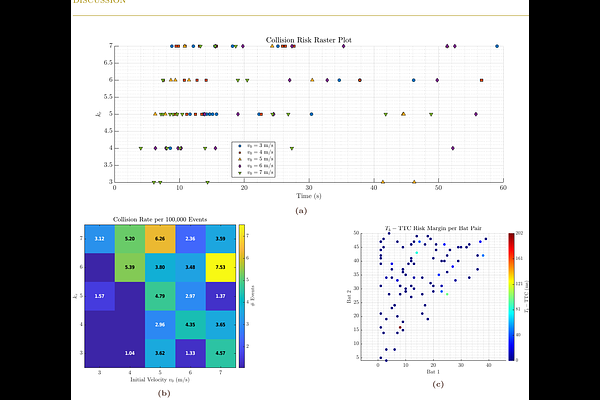Swarm Cohesion in Bats Emerges from Stable Temporal Loops

Swarm Cohesion in Bats Emerges from Stable Temporal Loops
Umadi, R.
AbstractSwarming in echolocating bats presents a compelling example of decentralised coordination driven by acoustic sensing. Unlike visually guided animals, bats navigate and maintain cohesion in dense groups using self-generated sonar signals. I present a biologically grounded simulation framework in which agents operate asynchronously using a closed-loop control policy based on local echo delays. Building on the theory of biosonar responsivity and the deduction of temporal precision in bat echolocation, my model predicts a tight coupling between echo delay, call duration, and call rate, and demonstrates that local, echo-timed interactions suffice to generate stable, self-organised swarm behaviour. To test these predictions, I systematically varied initial velocity and responsivity coefficient, kr, across a simulation grid and analysed the resulting call dynamics and collision risks. An information propagation model was derived, estimating the effective spatiotemporal speed of behavioural updates across the swarm. I also developed a decay-based model of perturbation attenuation to quantify the spatial limit of influence for local disturbances. Together, these analyses reveal a trade-off between responsiveness and stability: lower kr yields faster information flow but higher collision risk in denser regions, while higher kr promotes stability but reduces reactivity. My results align closely with recent empirical findings and provide a generative explanation for swarm cohesion based on the temporal precision of echolocation. These insights offer a promising design framework for decentralised control in bioinspired robotic swarms, where stability, autonomy, and resilience emerge from local sensing and feedback, rather than explicit synchrony or global coordination.